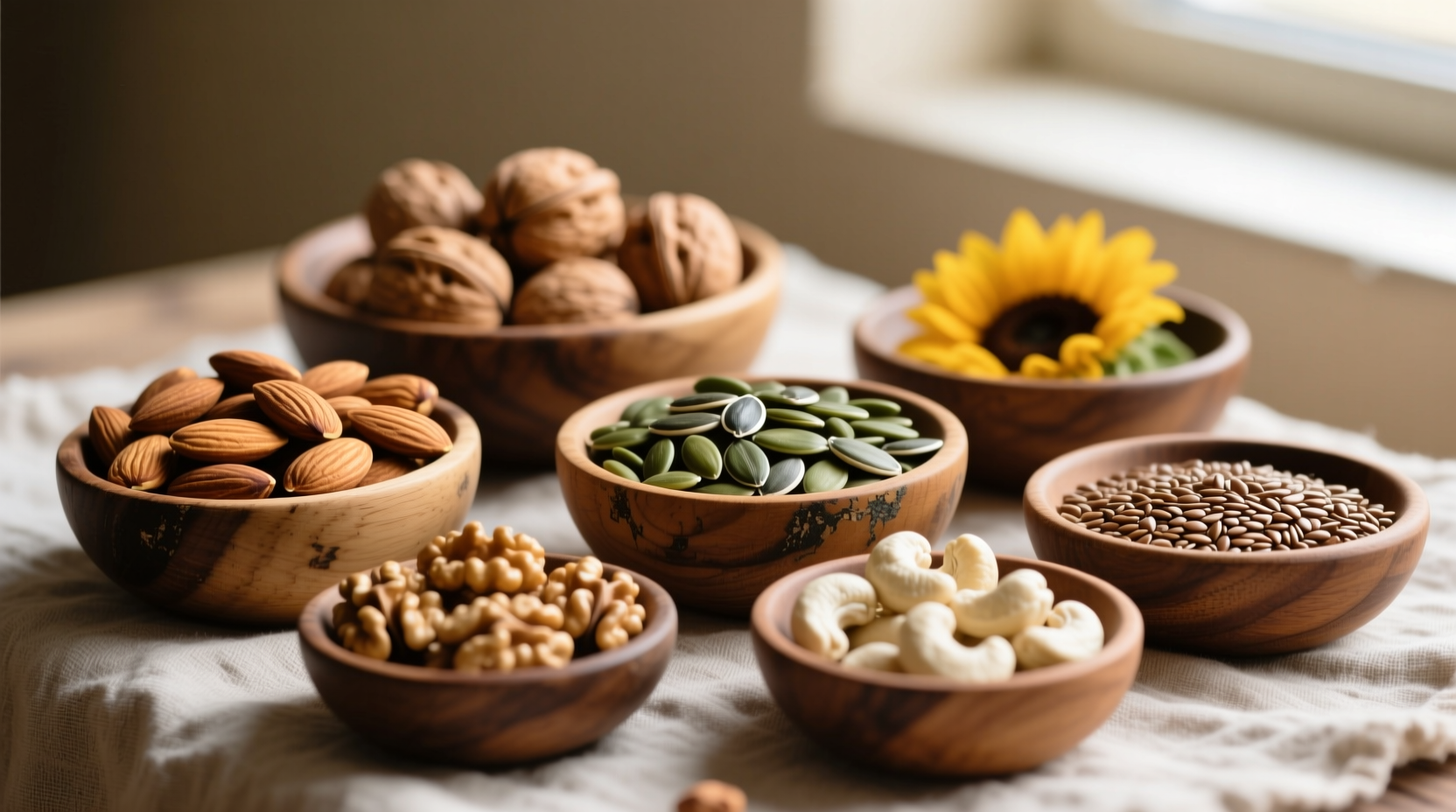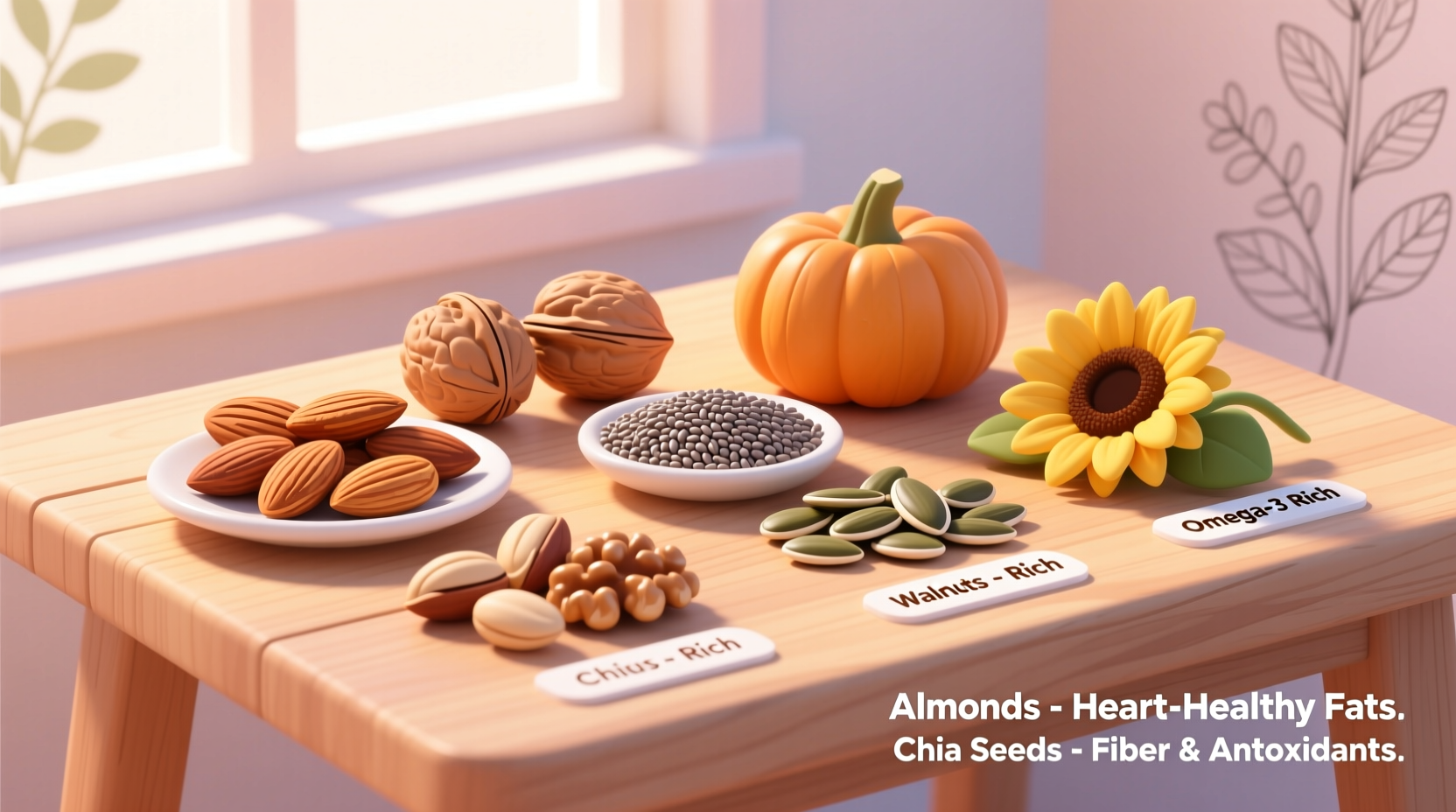Discover exactly how different nuts and seeds enhance your health, which varieties deliver maximum benefits, and practical ways to incorporate them into your daily diet. This evidence-based guide cuts through nutrition myths with research-backed insights you can trust.
Why Nuts and Seeds Belong in Your Daily Diet
Modern nutritional science confirms what ancient cultures instinctively knew: nuts and seeds pack extraordinary health benefits. Unlike processed snacks, these natural powerhouses deliver complete nutrition in compact packages. Research from Harvard T.H. Chan School of Public Health shows regular nut consumption correlates with a 20% lower risk of heart disease and 15% reduced mortality from all causes (Harvard Nutrition Source).
What makes them special? Their unique nutrient synergy. Nuts and seeds combine heart-healthy monounsaturated and polyunsaturated fats with plant-based protein, dietary fiber, and essential micronutrients. This combination works better together than any single supplement could replicate.
Your Nutritional Powerhouse Cheat Sheet
Not all nuts and seeds deliver identical benefits. Understanding their unique profiles helps you maximize health returns. The USDA FoodData Central database reveals significant nutritional differences between varieties:
| Nut/Seed | Key Nutrients | Unique Health Benefits | Recommended Daily Portion |
|---|---|---|---|
| Almonds | Vitamin E, Magnesium, Fiber | Reduces LDL cholesterol, supports bone health | 23 whole nuts (1 oz) |
| Walnuts | Omega-3 ALA, Polyphenols | Boosts brain function, reduces inflammation | 14 halves (1 oz) |
| Chia Seeds | Omega-3 ALA, Fiber, Calcium | Regulates blood sugar, supports digestion | 1 tablespoon (12g) |
| Pumpkin Seeds | Zinc, Magnesium, Iron | Supports immune function, prostate health | 1.5 tablespoons (28g) |
Heart Health: The Scientific Consensus
Cardiovascular researchers consistently identify nuts and seeds as protective foods. The American Heart Association recommends including unsalted nuts in a heart-healthy diet due to their cholesterol-lowering effects. A landmark study published in Circulation followed 210,000 health professionals for 32 years, finding that those consuming five or more one-ounce servings of nuts weekly had a 14% lower risk of cardiovascular disease and 20% lower risk of coronary heart disease compared to non-consumers (Circulation, 2017).
The mechanism? Nuts improve endothelial function (blood vessel health), reduce oxidative stress, and lower inflammation markers like C-reactive protein. Walnuts and flaxseeds particularly excel due to their high omega-3 fatty acid content.
Brain Boosters Backed by Research
Your cognitive health benefits significantly from regular nut consumption. A 2020 study in The American Journal of Clinical Nutrition analyzed data from 5,000+ adults over five years, finding that daily nut consumers showed better memory, focus, and processing speed than non-consumers. Walnuts lead this category with their unique combination of DHA precursors, polyphenols, and vitamin E.
"The evidence supporting nuts for brain health continues to strengthen," explains Dr. Martha Clare Morris, nutritional epidemiologist at Rush University. "Walnuts contain over 15 antioxidant compounds and the highest plant-based omega-3 content of any nut, creating ideal conditions for neuronal protection."

Weight Management Myths Debunked
Despite their calorie density, nuts and seeds support healthy weight management when consumed appropriately. The PREDIMED study, tracking 7,000+ participants for five years, found that those following a Mediterranean diet supplemented with nuts lost more abdominal fat than the control group, despite no calorie restriction (New England Journal of Medicine).
Why? Three mechanisms work together:
- Satiety effect: The protein-fat-fiber combination increases fullness hormones
- Partial fat absorption: 5-15% of nut fats remain trapped in cell walls
- Thermic effect: Digesting nuts burns more calories than processed foods
Important Context Boundaries
While generally beneficial, certain populations should exercise caution with nuts and seeds:
- Allergy concerns: Tree nut allergies affect approximately 1.1% of Americans (Food Allergy Research & Education). Always introduce new nuts gradually if allergy history exists.
- Dental considerations: Hard nuts may damage dental work; consider softer options like cashews or ground seeds.
- Medication interactions: Walnuts' high vitamin K content may interfere with blood thinners like warfarin (consult your physician).
- Digestive sensitivity: Phytic acid in raw nuts may reduce mineral absorption for those with compromised digestion; soaking or roasting improves tolerance.
Practical Incorporation Strategies
Maximize benefits with these evidence-based approaches:
- Portion control: Pre-portion servings into small containers to avoid overconsumption
- Smart substitutions: Replace unhealthy snacks like chips with a 1-ounce nut serving
- Breakfast boost: Add chia or flaxseeds to oatmeal or smoothies for sustained energy
- Cooking integration: Use nut flours in baking or seed oils for dressings
- Storage: Keep nuts in airtight containers in the refrigerator to prevent rancidity
For optimal freshness, purchase raw nuts and seeds then roast them yourself at 350°F for 8-12 minutes. This enhances flavor while preserving nutrients better than commercially roasted options with added oils.
Addressing Common Misconceptions
Several myths persist about nuts and seeds that deserve clarification:
- Myth: Nuts cause weight gain Fact: Population studies consistently show nut consumers have lower obesity rates
- Myth: All nuts are nutritionally identical Fact: Each variety offers unique nutrient profiles requiring dietary diversity
- Myth: Raw is always better than roasted Fact: Light roasting improves antioxidant availability in most nuts
- Myth: Nut butters lose nutritional value Fact: Natural nut butters retain most benefits when no sugar/oil is added
Your Action Plan for Nutritional Enhancement
Start incorporating these science-backed strategies today:
- Begin with one daily ounce serving of mixed nuts and seeds
- Rotate varieties weekly to maximize nutrient diversity
- Pair with vitamin C-rich foods to enhance iron absorption
- Choose unsalted varieties to control sodium intake
- Track how you feel after two weeks of consistent consumption
Remember that nuts and seeds work best as part of an overall balanced diet rich in fruits, vegetables, and whole grains. Their true power emerges through consistent, long-term inclusion rather than occasional consumption.











 浙公网安备
33010002000092号
浙公网安备
33010002000092号 浙B2-20120091-4
浙B2-20120091-4